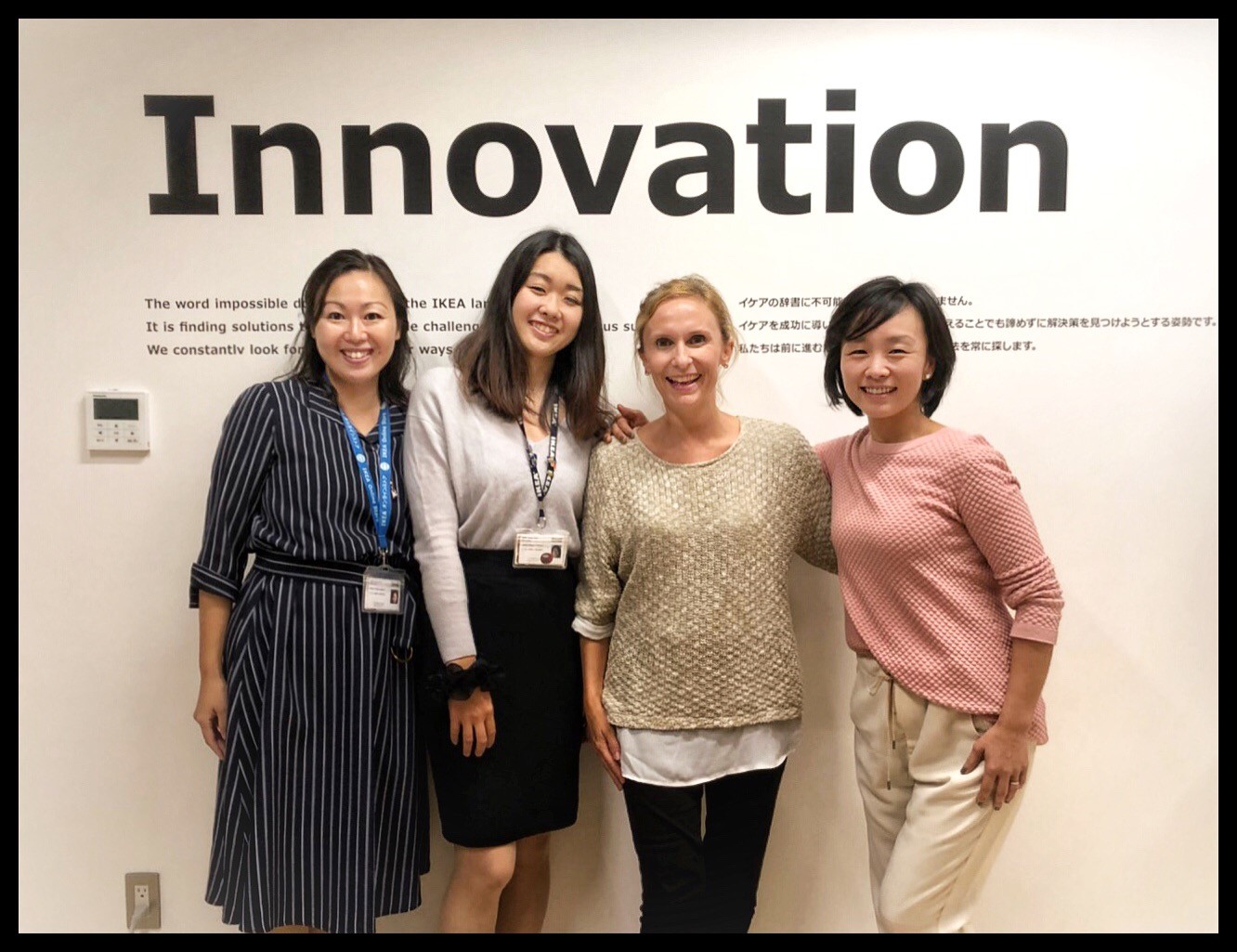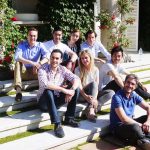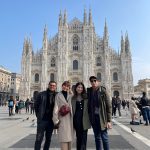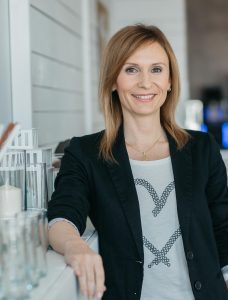
Name: Carolina Garcia
Year of Graduation: 2004
Nationality: Spain
Country of Residence: Poland
Current Employer: IKEA
Tell us about you and your story. How have you made your career choices up to where you are today?
I’m Carolina García, my friends call me Carol. Since my life begun, I’ve moved around a lot. It’s something that has been inside of me which helped me to be where I am today. My parents are Spanish but I was born in Venezuela because my parents were working there. Majority of my life was spent in Bilbao, Spain where I studied Industrial Engineering. Today, this is where most of my family resides.
After my studies, I started working for IDOM, a consultancy and engineering company, for two years. I discovered IESE through my peers in this company and later on, they supported me to go for my MBA in 2002. After I graduated from IESE, I went back to Bilbao where I started to work for a small company in logistics. At that moment, I knew IKEA was opening in Bilbao. I always say that it was curiosity and new ways of seeing things that drew me to IKEA. Not to mention that I am a super IKEA fan, I even drive from Bilbao to Madrid to shop! So when I knew there were hiring I said, Why not? I was curious about multinational corporations and how they work. I applied to be a Sales Manager in the store and told myself, Let’s see what happens!
For me IKEA was different in many aspects. I had no experience in retail, sales and commercial area at all. I had never been a leader for big things. They knew about my background and of course, having an MBA at IESE made them realize I must be someone with potential. I started in the Sales Area then the curiosity came to me again and I thought it was time to pursue some international experience. So I asked for the possibility to do it and I had a chance to go to Sweden and work within the Global Organization, in the Commercial Area as a Project Manager related to Sales. This experience went from a plan of 1 year to an experience of 2 years of winter in Sweden (away from sunny Spain). It allowed me to understand the company in a totally different way from the store which was more operational and short-term to the global organization which was more strategic and long-term. It was also great to be a part of the network in the central office.
Then the Spanish office asked me to go to Malaga for 2 years as a Store Manager leading 400 people and managing the sales and profitability. It was truly the first huge leadership position I took in IKEA. Next opportunity I had was to open a new store in Valencia. For any Store Manager, it is a dream to open a new store because it is about building the team from zero, building the organization, the routine, structure, of the store. So I led the opening of this store. This is also, I say, one of the most important points in my career – not only because of the responsibility of opening a new store but also because in that moment it was the financial crisis in Spain and unemployment in that area was at 30%. We went out to the market with 400 positions and received 100,000 applications. It was eye opening for the company to see the need for jobs for so many people. For me, what I realized was, What is the responsibility that I have in this position? Not only to make the company successful but to provide jobs to 400 persons for their families. Our mindset was to help them succeed and say: Now we have to do it the right way. I think this is a key point in terms of responsibilities in my career.
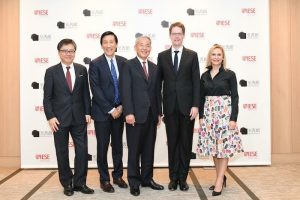
Carolina with IESE Dean Franz Heukamp, senior executives from top Japanese companies at an IESE event in Japan
I ran the Valencia store for 1 year. After our Internal Assessment, they offered me to go to Czech Republic as Deputy CEO / Deputy Retail Manager taking care of Hungary, Czech Republic and Slovakia. The key change here is going from your own country where you are familiar with the culture and language then learning to lead in another country. At the beginning I thought, we are Europe, we are very similar but there are also a lot of cultural differences which is important in the way you lead – how you adapt and how you have to know the culture of the country, their history. The challenge was finding the right balance between leveraging the strengths of the team but also contributing with your own difference. It was super interesting to work with 3 countries at the same time, all with different languages, currencies and legislation – small but big considerations which you have to manage all together.
Then my dream was to be Country Manager in IKEA. At that moment there was no opportunity and I really wanted to continue to develop myself. So they offered me a role in Asia for another experience in a new culture and continent. I went to Japan as a Deputy Retail Manager in a totally different and interesting market. IKEA was not as well-known as Europe, our market share was very low but with huge potential. How do we enter in the market where we were still small and with a lot of barriers such as brand awareness? Tokyo is not a city where people own cars – this is where we came up with city stores.
After a year in Japan, an opportunity came in Poland and I started as CEO / Country Manager of IKEA in Poland. Taking all the learnings from all the experiences I’ve had, it was great because of the speed of the economy, the country, and the energy of the team. The main challenge we have now is that IKEA is going through a transformational time in terms of organization, leadership, etc – it will be very interesting for the next few years.
If you look back at the career choices you’ve made, what were the most important lessons you’ve gained?
Something that has been very important for me along the way is curiosity. I have never liked status quo too much. Have the curiosity to try different things to know what you like doing better. I realized that being Project Leader, working for pure technical matters or logistics were not the best for me because it didn’t give me so much energy. I really liked working with people. Another small but important detail I found was that I enjoyed working with beautiful things, furniture was one example – this gave me energy. I could be working in a factory but at least it’s with a product that I actually liked. Curiosity helps you determine what you really love doing and what inspires you.
Another important thing I’ve learnt is to be resilient and to be humble – not everything goes in the right direction and sometimes you simply have to learn to be able to develop yourself along the way.
When I look at the career of other leaders, what I feel is you need to deliver results but you have to do it right. You have to develop the business and at the same time the people around you – to take care of the community where you are.
What are the best things as well as most challenging things you’ve encountered as a top female leader in business?
IKEA is a company that works well with diversity. In many countries, many of the CEOs are women. But in many interviews, I have this question. So I believe we women are expected to be perfect at work, at home, we need to have a perfect family and this puts a lot of pressure on us. At the same time we do not want to take too many risks. First, we need to be perfect then that’s the only time we can go ahead.
For example, in some countries I’ve been to, we had managerial positions open but simply there were no women applying because they were afraid they would not be able to balance work with their family or they were not good enough or perfect enough. I think it’s about self-confidence and support which would push us more to take a risk. However, we don’t only address work life balance for women – we need to do it also for men who have different social pressures.
On leadership, how do you think your way of leading people has changed throughout the years? Is an MBA valuable in this regard?
The MBA totally changed my career. I was an engineer – I thought my career would be technical or a project leader. What the IESE MBA taught me was more on the leadership part, how to manage different situations, how to work with different people. IESE is very values-driven business school meaning we are not only here to learn how to do business but to make life better for others and to create a better society. IESE was an opportunity for me to drive home the point that I would like to develop my career more in the leadership or management area – that was the first input.
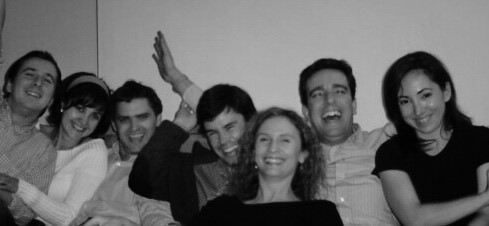
Carolina with her team C4 during her MBA
When I started with IKEA which is an interdependent leadership, I had to change the way I was used to leading in a different and more technical environment. I had a difficult time at the beginning because for them I was not taking any decision but for me I do not want to take decisions alone but with everyone else. Being in a new country was also different from what I knew back home.
At IKEA, it’s all about performance leadership and how we get into a digital mindset, innovation, circularity and working in a different way. Some of the competencies we had before may not be valuable anymore so we need to keep evolving.
Which IKEA product represents you most?
If I were a product line or area, it would be the kitchen side – it is value for money and quality.
If I were a product, it would be the water can. A simple product but it represents what IKEA values and what I value. It is about democratic design where you have (1) good design, (2) function, (3) low price (4) sustainability and (5) quality. I like this because the water can is a tool which you can water the garden for flowers to grow. This seems basic but when you water your environment with a bit of motivation, they can flourish. It becomes not only a solitary flower but contributes to a beautiful garden.
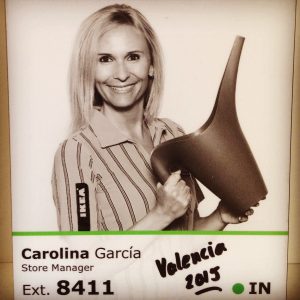
If Carolina was an IKEA product…
What keeps you busy outside of work?
I am able to move around easily because I have no kids, on one hand that makes life a little bit easier to take the decisions to move but it also becomes difficult when you start from scratch every time you move to a new country, you don’t have the same community and support. My family is in Spain, my friends too and my partner is in Prague. Outside work, I have to travel a lot to see the people who are important to me to keep the roots and connections. I have learned to be a super-guru in planning my travels in advance, keeping connected online and the like. Other than these travels, I also like discovering new places – mountains, outdoor activities and more!
What advice would you give yourself when you were starting out your career?
Contrary to when we spoke about perfection, my advice would be: Don’t think too much! Sometimes we think too much about the consequence very much ahead before anything happens. Should I do an MBA? I don’t know if I will get married or I will have kids. So sometimes it is about not thinking too much, it is more important to have the energy and curiosity to think about steps to develop yourself and to determine what you really want as a person in the future. And believe that anything is possible! Sometimes you have to get out of your comfort zone – it´s not easy – but with the support of family and friends you can do anything – so again, don’t think too much!
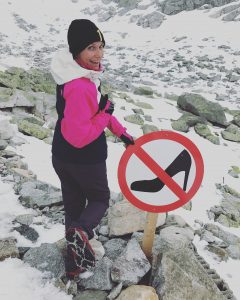
Carolina’s advice: Believe that anything is possible!
Thank you Carolina for sharing your story!
Pursue your dream MBA! Take these next steps today:


